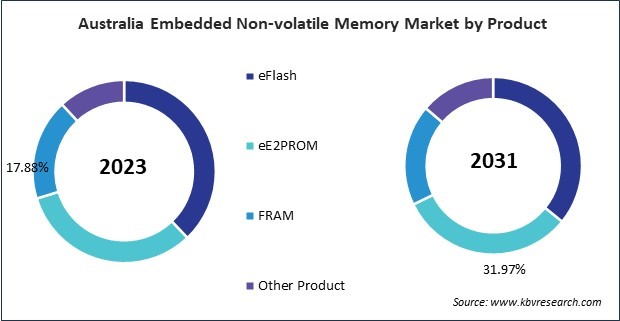The Asia Pacific Embedded Non-volatile Memory Market would witness market growth of 11.7% CAGR during the forecast period (2024-2031).
The China market dominated the Asia Pacific Embedded Non-volatile Memory Market by Country in 2023, and would continue to be a dominant market till 2031; thereby, achieving a market value of $1,213 million by 2031. The Japan market is registering a CAGR of 11% during (2024 - 2031). Additionally, The India market would showcase a CAGR of 12.6% during (2024 - 2031).

In the telecommunications sector, the rollout of 5G networks is driving demand for more advanced memory solutions to support the increased data processing and storage needs associated with next-generation communication technologies. 5G promises faster data speeds, lower latency, and the ability to connect many devices simultaneously, all of which require significant advancements in semiconductor technology. According to Ericsson’s 5G Network Coverage Outlook, 5G population coverage outside of mainland China reached around 40 percent at the end of 2023 and is projected to increase to about 80 percent in 2029.
Intelligent transportation systems, another cornerstone of smart cities, also benefit from the capabilities of eNVM. These systems consist of public transportation networks, connected vehicles, and traffic management solutions that communicate in real-time to improve safety, reduce congestion, and optimize traffic flow. The data generated by these systems must be stored and processed rapidly and reliably, making eNVM an ideal choice. For example, traffic signals equipped with sensors can modify their timing in accordance with real-time traffic conditions, and connected vehicles can exchange information to prevent accidents.
In India, the electronics manufacturing sector is expanding rapidly, encompassing the production of smartphones, tablets, laptops, and other consumer electronics, leading to an increased demand for advanced memory solutions. eNVM, with its higher performance and capacity, addresses the growing needs of these electronic devices. According to the Investment Promotion and Facilitation Agency, India’s electronics production is projected to reach $300 billion by FY26, with domestic production having grown from $49 billion in FY17 to $101 billion in FY23, a 13% increase. The increasing production and consumption of high-end smartphones and wearables in India further drive the need for eNVM. These devices require fast, reliable memory solutions for high-resolution cameras, complex applications, and extensive data storage. In FY23, India’s domestic electronics production was valued at $101 billion, with mobile phones accounting for 43%. Government initiatives such as “Make in India” and the “National Policy on Electronics” are fostering growth in the electronics manufacturing and semiconductor industries. These policies encourage investment in eNVM technologies as part of a broader effort to advance India’s electronics sector. Thus, the growth of the consumer electronics industry and the expanding telecommunications sector are key drivers of market growth in the region.
Free Valuable Insights: The Global Embedded Non-volatile Memory Market is Predict to reach USD 8.8 Billion by 2031, at a CAGR of 11.3%
Based on Wafer Size, the market is segmented into >100 mm and <100 mm. Based on Product, the market is segmented into eFlash, eE2PROM, FRAM, and Other Product. Based on Application, the market is segmented into BFSI, Information Technology, Consumer Electronics, Telecommunications, Government, and Others Application. Based on countries, the market is segmented into China, Japan, India, South Korea, Australia, Malaysia, and Rest of Asia Pacific.
By Wafer Size
By Product
By Application
By Country
Our team of dedicated experts can provide you with attractive expansion opportunities for your business.

